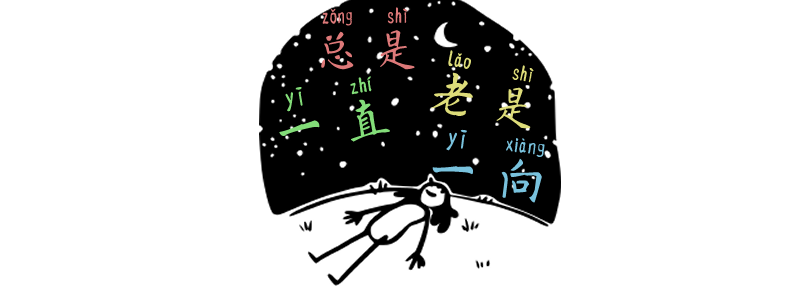There are four ways to say “always” in Chinese, and these are the words 总是 zǒngshì, 老是 lǎoshì, 一向 yíxiàng and 一直 yìzhí. However, there are subtle differences in the nuances of these words that are worth noting:
总是 zǒngshì
总是 zǒngshì is used to emphasize a high probability or frequency.
他上午八點總是在圖書館看書他上午八点总是在图书馆看书
He is always in the library at 8:00 a.m. reading books.
父母總是在孩子需要他們時給予幫助父母总是在孩子需要他们时给予帮助
Parents are always there to help their children when they need them.
老是 lǎoshì
This adverb is often used to express a sense of annoyance or frustration, and can sometimes have a negative connotation. It implies that something happens too frequently or continuously, to the point of being irritating.
你為什麼老是遲到?你为什么老是迟到?
Why are you always late?
我說的話,他老是不記得我说的话,他老是不记得
He always doesn’t remember what I say.
一向 yíxiàng
This one tends to be used more in formal or polite language and can also imply a sense of consistency or habit. Compared to the other adverbs, 一向 yíxiàng is often used to describe someone’s long-standing habit or a situation that has been consistently maintained over time, like a constant fact.
台灣一向沒有給小費的文化台湾一向没有给小费的文化
Taiwan has never had a culture of tipping.
我認識這位爺爺五十年了,他一向給人謙虛有禮貌的印象我认识这位爷爷五十年了,他一向给人谦虚有礼貌的印象
I have known this old man for fifty years. He has always given an impression of modesty and politeness.
一直 yìzhí
It typically refers to something that is continuous or uninterrupted. And it can also be used to describe a situation that persists over a period of time.
我從去年開始就一直學習中文我从去年开始就一直学习中文
I have been learning Chinese since last year.
我一直想去歐洲旅遊一次我一直想去欧洲旅游一次
I’ve always wanted to travel to Europe once.
Comparison
| 一直 yìzhí | 一向 yíxiàng | 总是 zǒngshì | 老是 lǎoshì | |
|---|---|---|---|---|
| Meaning | Continuous action or state. | Long-term, habitual consistency. | Repeated actions or behaviors. | Repeated actions, often negative or annoying. |
| Time Frame | Flexible (past, present, future). | Past to present. | Any time frame. | Any time frame. |
| Focus | Duration or ongoing process. | Habits or tendencies. | Frequency of occurrence. | Frequency of occurrence, with a negative tone. |
| Tone | Neutral, casual. | Neutral, sometimes formal. | Neutral, everyday usage. | Informal, often critical or complaining. |
| Common Contexts | Ongoing actions or states. | Personal habits or traits. | Regular, predictable actions. | Annoying or undesirable repetitive behaviors. |
Practice
- He always arrives on time.
- We always celebrate Thanksgiving with a big family dinner.
- He always arrives early.
- It rained a lot last month.
- It has been raining for a week.
- I have no clue till now.


